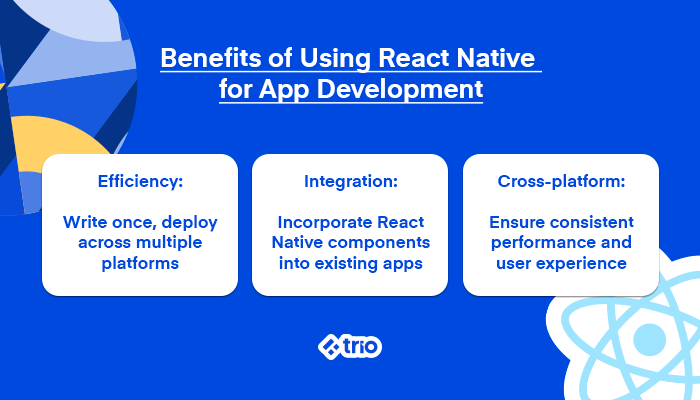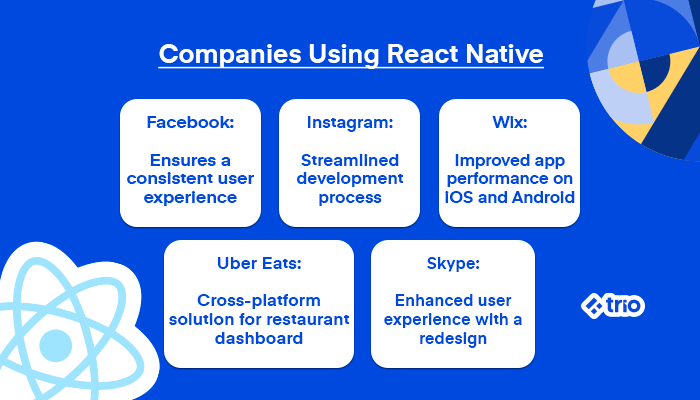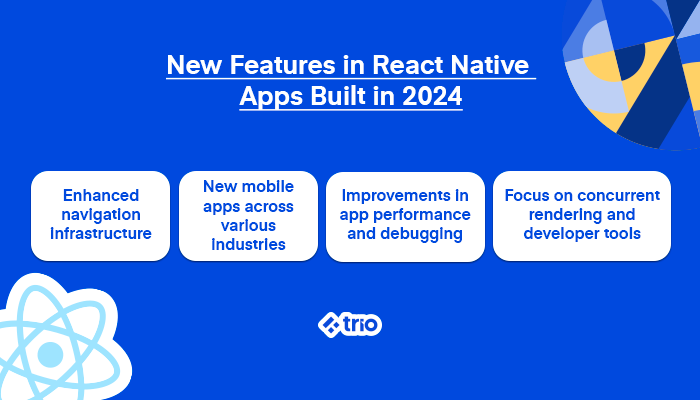Are you trying to build a seamless mobile app that works flawlessly on both iOS and Android platforms? Many people would suggest using React Native for something like this.
But is it the right platform for you?
Well, to help you figure it out, let’s look at some of the biggest apps that have been built using React Native.
If you are looking to hire skilled React Native developers, Trio.dev offers a range of solutions, from individual developers to full-service development teams.
Whether you need staff augmentation or a dedicated development partner, Trio.dev can help you achieve your goals with confidence.
Are you ready to start your development project?
We have the developers you need to take your development project in the right direction.
Companies are proven to grow their business faster with Trio.
What are the benefits of using React Native for app development?

Native app development efficiency
React Native app development streamlines the process of native development. It does this by allowing you to write code once but deploy it across multiple platforms.
This is great for efficiency, as you don’t have to write different sets of native code for Android and iOS apps.
Additionally, React Native allows developers to make use of the React libraries that people love for React apps, which can also increase your efficiency when working on a React Native project.
Integrating React Native with existing native apps
React Native is well known for its ability to integrate with existing native apps. This means that you can incorporate certain React Native components into apps that already exist without needing to rewrite the entire codebase.
Making use of this hybrid approach saves you time if you decide that you would like to utilize certain React Native features.
Many developers find it efficient to integrate React Native into their existing native apps, enhancing functionality without starting from scratch.
Advantages of building cross-platform apps
As already mentioned, you can use the same code set for apps that work on multiple platforms. Building these cross-platform apps has several benefits.
First, building apps this way ensures consistent performance and user experience regardless of the device.
By reusing most of the code, you can save time and resources during the development process, too.
React Native also makes it easier to maintain and update your apps so they are the same at all times.
The shared codebase for multiple apps allows you to end up with fewer bugs and quicker iterations. The resulting final product is thus more polished and helps you deliver the app with minimal hassle.
How can React Native be utilized in mobile app development?
Creating iOS and Android apps with React Native
When creating an app for Android and iOS using React Native, you can make use of the component-based architecture and pre-built libraries.
These can greatly simplify the development process and let you focus on building innovative features instead of spending all of your time on platform-specific issues.
Developing native mobile applications with React Native
Outside of cross-platform app development, you can also use React Native to build native mobile apps.
This is greatly encouraged by being able to leverage native modules, which allow you to access device-specific functionalities.
To utilize these native capabilities, React Native uses a concept called the “bridge” to enable communication between JavaScript and native threads.
This bridge allows React Native to deliver native performance by sending asynchronous messages between the JavaScript code and the native components.
The resulting React Native-based app provides a truly native feel while developers still benefit from React Native’s efficiency.
Expanding into new markets using React Native
If you want to expand into new markets, React Native offers you a strategic advantage.
It can support multiple languages and regions, allowing React Native developers to localize apps and cater to a global audience without needing to redevelop the app.
Also, you can run user-testing sessions with React to ensure your app meets the needs of your target audience, further enhancing its effectiveness and appeal.
Which companies have successfully used React Native for their mobile apps?
Case studies of companies using React Native
Several high-profile companies have decided to use React Native when developing mobile apps.
Facebook, which initially developed React Native, uses it extensively in its app, ensuring a consistent user experience across platforms.
Facebook’s first React Native app set a strong precedent for the framework’s capabilities.
Instagram also leveraged this framework. React Native makes it possible for Instagram to streamline its development process, resulting in a faster and more responsive app.
The Wix mobile app is another great example of a successful application built with React Native. Wix created a high-performance app on both iOS and Android by using React Native.
The Wix app was initially developed using traditional methods, but the transition to React Native significantly improved the performance of the app.
Airbnb required a robust solution for their complex app needs. Although Airbnb eventually transitioned away from React Native, its initial use demonstrated the framework’s potential for building high-traffic apps.
Uber Eats also needed a cross-platform solution for their restaurant dashboard and used React Native to develop this solution. The resulting increase in user experience has benefitted both the company and its users.
Some other examples include Skype, which redesigned the entire app using React Native for both mobile and desktop, enhancing their user experience significantly, as well as Discord and Bloomberg.
Discord leveraged React Native for a consistent cross-platform experience, while Bloomberg used React Native for its consumer app, which provides a rich, interactive experience.
All of these discussed, along with Sound Pulse, Pinterest, and a seemingly infinite amount of others, make use of React Native or have done so at some point in their development. It would be impossible to list them all.
React Native has been used across various industries, including finance, retail, healthcare, and education.

What are some key features of popular React Native apps Built in 2024?

Enhanced navigation in React Native applications
In 2024, React Native apps have seen significant improvements in navigation infrastructure.
Enhanced libraries and tools have made it easier to implement smooth, intuitive navigation, enhancing the overall user experience.
New mobile apps powered by React Native technology
Several new mobile apps with React Native have recently emerged in the market.
These apps span various industries, from e-commerce to healthcare, showcasing the versatility and adaptability of React Native technology.
Some newer examples include Gyroscope, Discord, Bloomscape, Wix, SoundCloud Pulse, Shine, Townske, Salesforce, and Delivery.com.
Improvements made by version updates of React Native
Each new version of React Native continues to evolve, offering developers more tools and features to create cutting-edge apps.
Improvements in app performance, debugging, and compatibility have solidified React Native’s position as a leading framework for mobile app development.
The latest versions focus on improving the framework’s speed and stability, making it even more efficient for developers.
Future trends suggest that React Native will continue to evolve with better support for concurrent rendering and enhanced developer tools.
These updates are designed to keep React Native at the forefront of mobile app development, offering new features and improvements that developers can leverage in their projects.
How has React Native transformed the mobile app industry?
Reimaging legacy iOS apps with React Native
React Native has enabled developers to reimagine and revitalize legacy iOS apps.
By integrating React Native components, these apps have gained a new lease on life, offering improved performance and a modern user interface without a complete overhaul.
Many companies have successfully converted their iOS app to React Native, enhancing functionality and user experience.
Making it possible to convert Android apps into React Native
Similarly, React Native has facilitated the conversion of traditional Android apps into cross-platform solutions.
This transformation process not only preserves the functionality of your original app but those that have adopted React Native also find it enhances their reach and usability.







